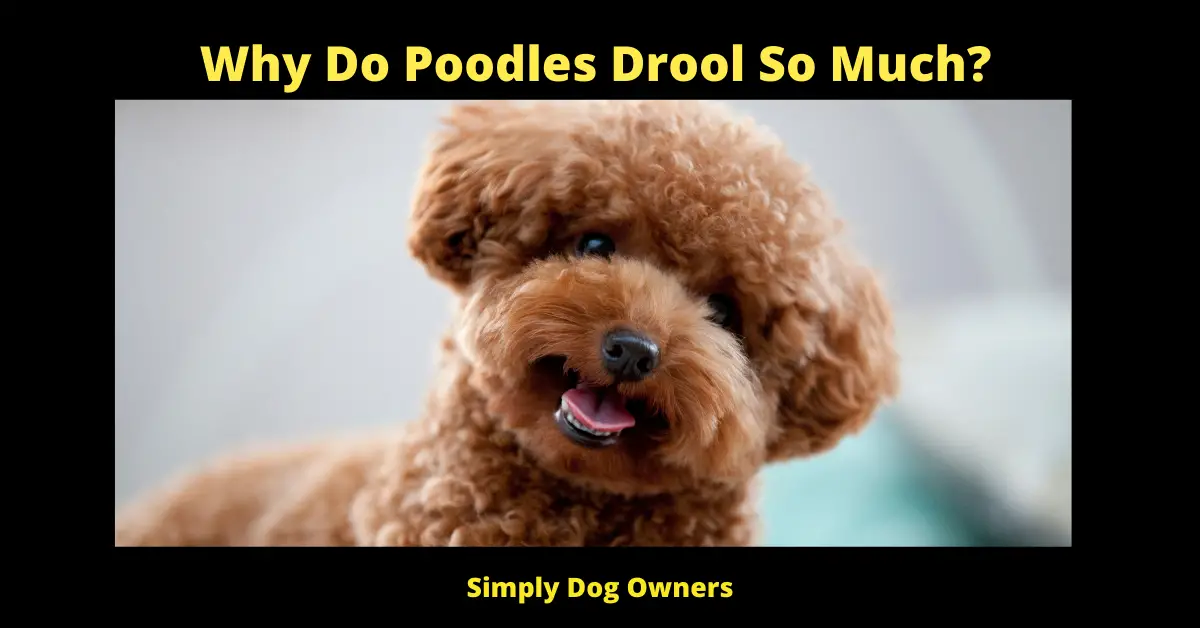Why do Poodles Drool so Much?
Why do poodles drool so much? While Poodles appear to exemplify a life of leisure and luxury, make no mistake: These are working dogs. Although it’s hard to believe when you see a primped-up Poodle in the show ring, the breed was first bred as a water retriever, a job that requires jumping into the water to retrieve waterfowl for hunters.
Indeed, the English word Poodle comes from the German word pudel, or pudelin, which means to splash in the water. And in France, Poodles are referred to as Caniche, a term derived from the French word chien canard, which translates as a duck dog.
Even the intricate coat styling for which the breed is famous once served a practical purpose: trimmed areas reduced the dog’s coat’s weight. They prevented it from snagging on underwater debris, but long hair over the joints and vital organs shielded the dog from the cold water.
There are three sizes of Poodles, all of which are considered part of the same breed: Toy, Miniature, and Standard. The Standard is probably the oldest of the three types, and some still work as water retrievers in the Poodle tradition.
Poodles, regardless of size, are renowned for their playful yet dignified personalities and keen intelligence. This dog is an “A” student when it comes to training, and the Poodle excels in performance sports such as obedience, agility, and hunt tests.
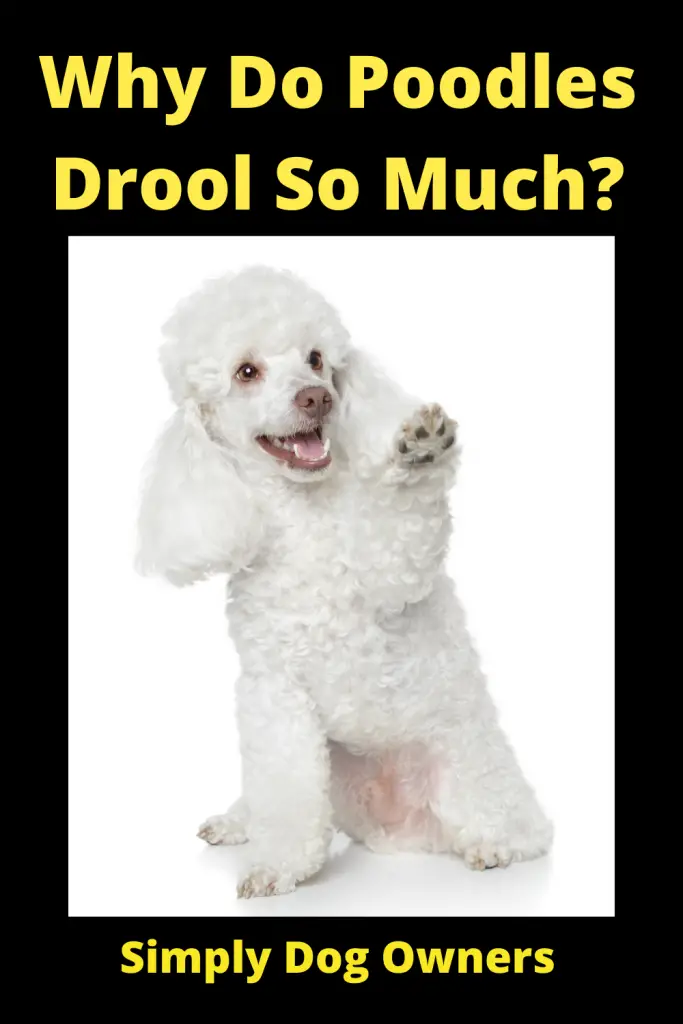
You adore your curly-haired Poodle: he’s intelligent, doesn’t shed, and rarely drools. However, your furry companion may occasionally drool excessively. When this occurs, it’s natural to be concerned and wonder if something else is going on.
Drooling in poodles is a normal bodily response to stimuli and is not a cause for concern in and of itself. Poodles drool when they are hungry, stressed, teething during a female’s heat cycle or when the outside temperature is excessive. Drooling may be a sign of something severe in rare instances, necessitating a veterinarian’s consultation.
What is Drooling a Sign of?
While poodles do drool, they are one of the least likely dog breeds to drool profusely. Poodles are typically a good choice if excessive Drooling is a nuisance or causes allergy problems in your home. However, if you notice that your Poodle is drooling more than usual during mealtimes, you should examine your Poodle’s environment and attempt to determine the cause.
Hunger or The Anticipation of Food
When your Poodle smells or sees food, it is common for the mouth to produce additional saliva involuntarily. Saliva helps in the digestion of food and prepare your Poodle for a tasty treat. There is nothing erroneous with this entirely natural reaction.
If your Poodle frequently drools as you prepare to eat, it may help to feed him at the same time. This way, your pup will not be drooling near the table, as he will be happily eating his meal.
New Stimuli Causing Excitement or Stress
Is the environment in which your Poodle lives stressful due to excessive noise, new people, or frequent relocation?
Poodles are an intelligent and trainable breed, but they are also extremely sensitive and easily stressed. Introducing your dog to new situations frequently results in drooling.
Reduce your voice volume and communicate with your Poodle in a gentle, patient, and reassuring manner. Take a break from stressful situations if possible and offer comfort.
Teething
If your poodle dog is young, he may be teething, just like human infants. Your poodle puppy will desire to bite objects because the sensation is pleasurable for the gums. On the other hand, Drooling is almost always associated with teething in infants, just as it is in humans.
Forge ahead with the assistance of some chew toys. You can even freeze some of his toys to provide some relief from the gnawing.
A Female’s First Heat
Are you the owner of a female poodle? If this is the case, Drooling is a common symptom of her first heat. As soon as it is secure to do so, spay your Poodle. Spaying your female Poodle not only prevents drooling but also reduces your dog’s risk of contracting infections and a variety of cancers.
Extreme External Temperature
When the weather is hot, you may observe that your Poodle drools more. This makes sense, as panting is a way for dogs to cool down. When dogs pant, their mouths remain open longer, allowing drool to escape.
Bring your dog to an excellent spot and provide him with a drink and, if available, ice cubes. Allow your Poodle to cool down, so he isn’t panting and drooling as much. The majority of reasons for your Poodle’s drool are entirely natural and usually manageable. However, there are occasionally less common causes of your Poodle’s drool.
Less Common Reasons a Poodle May Drool
Difficulty Swallowing
If you cannot attribute your Poodle’s Drooling to a normal response to the environment, there may be a more unusual cause. Drooling can occasionally be a sign of more severe health problems. Less common reasons for a poodle to drool include the following:
A variety of different conditions can cause swallowing difficulties. Your dog may have choked on a tennis ball fragment. He may have caught a cold, resulting in a sore throat that makes swallowing his saliva difficult. Your Poodle may even be suffering from an esophageal disease.
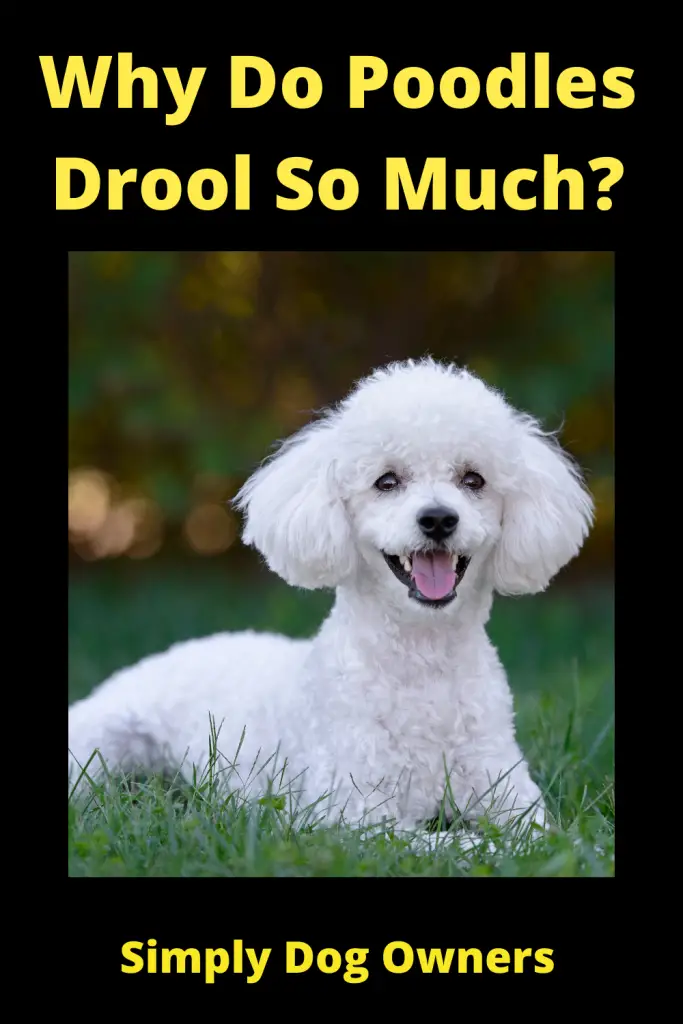
An Upset Stomach
Your Poodle’s sudden Drooling may be due to an upset stomach and nausea. As with humans, poodles may exhibit adverse reactions to a change in diet or specific foods, as well as to stressful or novel situations.
Reaction to Something Poisonous
Though frightening, your Poodle may have ingested a cleaning product or a portion of spoiled food.
Oral or Dental Disease
Your Poodle may be suffering from dental problems such as a cavity or mouth sores, causing him to produce an excessive amount of saliva in response to the pain.
Fever or Heat Stroke
Your Poodle may be suffering from a fever or rabies. When dogs become overheated, they pant, resulting in the production of saliva and drool.
Rabies
Rabies will manifest as excessive, foamy drooling and accompanied by other rabies symptoms such as agitation, disorientation, or a stumbling gait.
Because rabies manifests in various ways and is extremely serious, you should immediately contact a qualified veterinarian to ascertain what is wrong.
What Breed of Dog Drools the Most?
Drooling is a natural part of dog hood, but some dogs drool more than others. Drooling is a genetic trait; some dogs drool more than others.
Drool and slobber aid your puppy in eating and digesting his or her food. Additionally, there is a condition known as hypersalivation, which is treatable and is a sign of illness. Drooling is more prevalent in dogs with floppy lips than in dogs with tighter lips. Here are a few dog breeds that are well-known for their copious amounts of drooly saliva.
- Bernese Mountain Dog.
- Black and Tan Coonhound.
- Bloodhound.
- Bull Terrier.
- Bulldog.
- Neapolitan Mastiff. …
- Newfoundland. …
- Saint Bernard.
- Schnoodle
- Sussex Spaniel
Why is My Dog Licking and Drooling?
The primary reason dogs lick their mouths in conjunction with hypersalivation is nausea. Most nauseated dogs drool and then lick their mouths before vomiting.
Additionally, dogs may begin licking their mouths suddenly due to a bad or loose tooth, a strange taste in their mouth (for example, they licked something that tastes strange), or they have something caught in their mouth (such as a bone or stick). When they get something stuck in their mouths, they frequently paw at them as well.
Dogs will also drool if they lick something they are not supposed to, if they have a bad tooth, or have something stuck in their mouths.
Is Drooling a Sign of Stress in Dogs?
When dogs are nervous, they drool excessively, as stress can result in hypersalivation. If your dog is drooling more than normal due to stress or anxiety, try to remove the source of the stress. Additionally, it is critical to keep your dog hydrated, as they will lose a lot of fluid due to Drooling. Dogs are curious little creatures. From their intricate hierarchy system to their incredibly observable pack mentality, our beloved pups’ behavior is remarkable.
Often, dogs share our emotions (humans). The distinction is in their response to their distress. As similar as our emotions may be, our reactions to them can be entirely dissimilar. We will talk about one of the infamous emotions a dog can experience, nervousness, and why dogs drool when uneasy.
Numerous factors can cause your dog to become nervous, each of which will result in excessive Drooling. In the majority of cases, this is unremarkable. Since dogs descended from their wolf ancestors, they have drooled. However, it would help if you did not always depend on this. From significant health issues to minor changes in their routine, the health of your pup should always be taken seriously. It’s critical to understand your dog and to recognize when to seek professional assistance.
How can I Settle My Dog’s Stomach?
It is critical to consult your veterinarian before administering any home remedies for your pup’s stomach discomfort. If your veterinarian recommends at-home monitoring, the following are some suggestions you can discuss with them while at home with your dog.
Fasting
When your dog’s stomach is trying to eliminate something, it may be beneficial to refrain from adding additional items to their stomach for 12-24 hours. If your gastrointestinal (GI) system is experiencing difficulty, you do not want it to digest food.
While fasting may appear straightforward, it is critical to consult your veterinarian first, as some dogs (tiny breeds or those with pre-existing health conditions) do not tolerate it as well as others. If your veterinarian recommends fasting, inquire whether they would like you to begin a bland diet (and which one they recommend) following the fasting period.
Ice Cubes
While you want to keep your dog hydrated while vomiting or diarrhea, giving him too much water may aggravate his stomach. It is critical to monitor your dog’s water intake and discourage gulping. Provide ice chips to your dog to encourage drinking.
If your dog can consume small amounts of water or ice chips, you can gradually increase the quantity and frequency you offer the water and ice.
Canned Pumpkin
When it comes to treating indigestion and upset stomachs in dogs, many holistic veterinarians prefer 100% canned pumpkin. It has a bit glycemic index, which indicates it absorbs slowly, which aids in digestion and upset stomach.
Ensure that the canned pumpkin is 100 percent pure pumpkin, not pumpkin pie mix, as you do not like to feed your dog spices or other ingredients. Verify that no ingredients other than pumpkin are listed (such as sugar or sugar substitutes). Smaller dogs (approximately 5 pounds) should receive a half teaspoon of canned pumpkin, while larger dogs (about 75 pounds) should receive a tablespoonful.
Is Upset Stomach in Dogs a Sign of Food Allergies?
While an upset stomach is common in dogs, it may indicate that something is wrong with their GI tract if it occurs frequently. If your dog often experiences digestive upset, discuss the possibility of a food allergy with your veterinarian. When dogs are diagnosed with food allergies, it is frequently an allergy to a protein source, which is why a more “novel” protein may be recommended. There are numerous options available, but some examples include beef, buffalo, venison, and lamb.
How to Prevent Upset Stomach in Dogs
Consider giving your dog a prebiotic and probiotic to help maintain a healthy gut. Prebiotics and probiotics explicitly formulated for dogs are available over the counter. Ascertain that your veterinarian has a specific brand recommendation. Always consult your veterinarian first to determine the appropriate course of action.
How can I Help My Dog to Stop Drooling so Much?
Now that you’re aware of some of the more common and less common causes of your Poodle’s extreme drool, what are some things you can do to help prevent your dog from drooling in the first place? Several methods for preventing your Poodle from drooling include the following:
Look for a Blockage in the Throat.
If he allows it, examine his mouth and throat with a flashlight to determine if any foreign object is blocking a portion of his airway. Unless the thing is extremely easily removed, please do not attempt to remove it from your own throat. Make your way to the veterinarian.
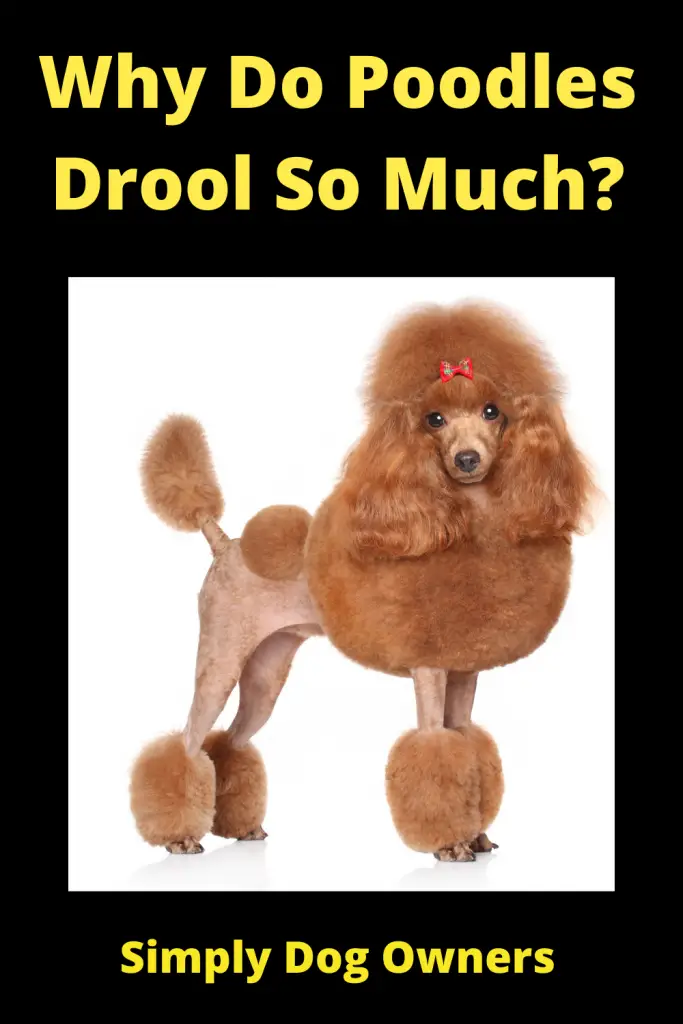
Check out your Poodle’s Teeth.
Poor oral health can be a significant contributor to excessive drool. If there is a dental problem, you may be able to determine the source. This will also necessitate a visit to the veterinarian.
Look for Behavioral Causes.
Identify the sources of stress and offer comfort, reassurance, and positive reinforcement. If you are having difficulty reducing your Poodle’s anxiety on your own, consult your veterinarian.
Create a Low–Stress Environment.
Assure that your dog has a quiet space to retreat to when the house is noisy or when visitors are noisy. A calm, uncluttered space with plenty of room to move and comforting toys is an excellent location for your dog to learn to retreat to.
Learn to Manage the Drool.
If you know your dog will drool at specific points, such as in the car, bring along a towel and allow your pup to wear a bandana to help soak up the drool. Occasionally, you cannot avoid drooling and must deal with it.
In many cases, a visit to the veterinarian is necessary to determine the cause of your Poodle’s Drooling.
Ask Your Vet for Help
Your Poodle requires routine veterinarian visits regardless of whether anything appears to be wrong. If he spends any time outside, he risks coming into contact with rabies-infected animals. Additionally, he may pick up ticks or mites, which can transmit diseases and cause excessive Drooling.
Regular visits to the veterinarian can ensure he receives the necessary vaccines and medications to protect him and keep him healthy and happy.
How to Prevent Drooling in Dogs
As mentioned previously, one of the most efficient ways to prevent your Poodle from Drooling is to create a stress-free environment. While no home can be completely stress-free, here are some suggestions to help. Owners should be consistent and establish boundaries to alleviate their Poodle’s stress and maintain their health, happiness, and safety.
Develop a Routine with Your Poodle and Stick to It
Establishing and adhering to a routine is critical for stress management and teaches your Poodle what to expect consistently. Poodles dogs are creatures of habit and routine; routines provide them with a sense of security and comfort.
For instance, if you wake up at 6 a.m. on weekdays, feed your poodle breakfast, and then take your Poodle for a walk before work, repeat the process on weekends.
Keep Your Poodle Active with Regular Exercise
Assure that your pup receives regular exercise to assist in burning off excess energy and reducing drooling. This is even more critical if your dog suffers from anxiety. Regular exercise has been shown to reduce dogs’ anxiety and to drool significantly. Poodles should receive between 30-60 minutes of exercise per day.
Take walks with your Poodle or play fetch with her. Humans, like poodles, become bored when there is insufficient activity to occupy their minds.
Be Mindful of Your Behavior
Maintain a low level of finger shaking and scolding tones. Because poodles are delicate, use a gentle tone and body language. Maintain consistency in the verbal discipline of your Poodle. For instance, if your Poodle is barking and wants him to stop, use a single word to communicate with him, not to become confused.
Maintain Important Boundaries
This one is entirely concerned with safety. While it may be exciting to give in to the large, sad, pleading eyes, try to prevent giving them table scraps or, if you must, observe their physical reactions afterwards. Poodles may exhibit drooling due to a sensitivity or allergy to certain foods.
Puppies and young dogs, in particular, view everything as a toy. As a result, if they come across something that appears to be chewable, they will take it. Keeping this in mind, keep cleaning products securely closed, locked, and out of reach of your dog. When in doubt, secure them with child locks in the cabinets where they are stored.
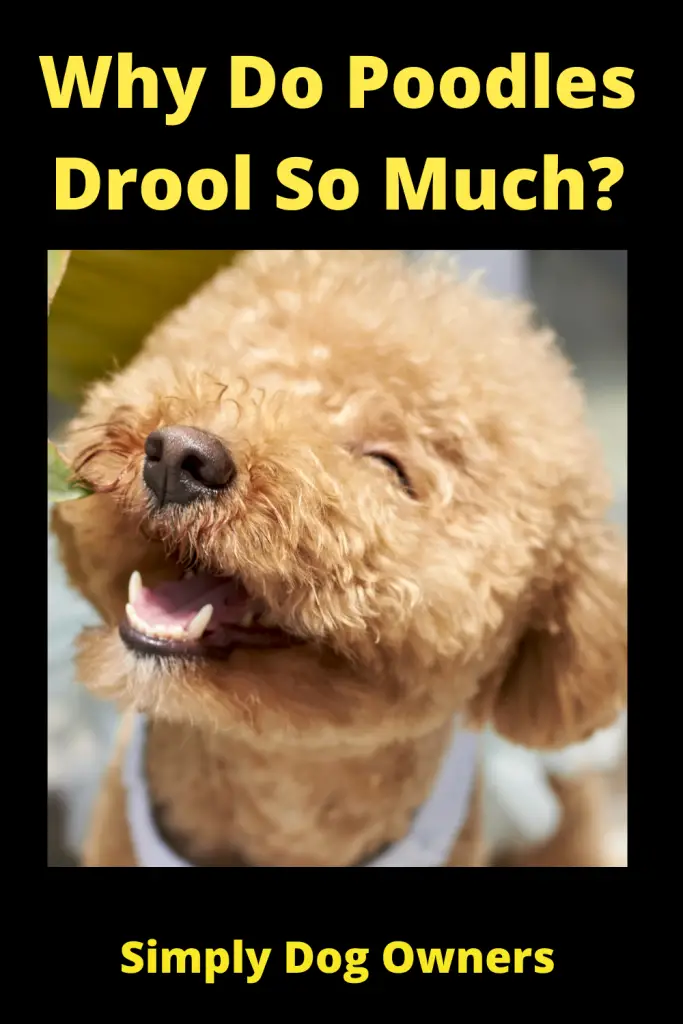
Final Thoughts
This may look like a lot of information for a little bit of extra drool; you can see that the causes range from benign to life-threatening.
Thus, the more you practice and observe your Poodle and his needs, the more you will begin to understand how, when, and why they become anxious and require your assistance. Additionally, you’ll be able to determine when drooling is caused by something other than environmental factors and requires the help of a vet to address the underlying issue.
